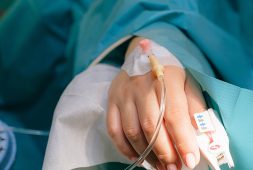
According to a scientific gathering of the European Society of Cardiology (ESC), women are at much higher risk of experiencing anxiety months after cardiac arrest than men.
Tracking 245 patients who had a cardiac arrest and then were admitted to the hospital in a coma, the study found that 43 percent of the women reported a level of anxiety that as considered borderline or higher four months after their heart stopped working suddenly. This was compared to 23 percent of men.
Author of the study and faculty member at the Department of Cardiology at the Rigshospitalet Copenhagen University Hospital in Denmark, Jesper Kjaergaard, MD, PhD, said in a press release, “Cardiac arrest occurs with little or no warning, and it’s common to feel anxious and low afterwards. Our study indicates that women are more affected psychologically and could be targeted for extra support.”
Women Found to Be More Likely to Report High Anxiety and PTSD After Cardiac Arrest
Such measures of anxiety and depression were found on the basis of the participant’s responses to a self-evaluation where patients rated statements related to psychological distress. One example of such was, “I get sudden feelings of panic.”
Anxiety and depression were both asked to be rated on a scale of 0 to 21. The average depression score for women was 3.3 compared to 2.6 for men. The average anxiety score was 6.1 for women versus 4.5 for men. The scores between 8 and 10 indicated ‘borderline anxiety or depression, while 11 or higher indicated anxiety or depression.’
In addition, Dr. Kjaergaard and his associated also noted that ‘23 percent of the women had borderline anxiety, compared with 11 percent of the men. One in five women had levels of anxiety above borderline, whereas just over 1 in 10 men did. Authors did not find significant differences in depression.’
As for the evaluation for PTSD (post-traumatic stress disorder), which was done separately, the research team saw that women had significantly higher scores. There was a median of 33, whereas it was only 26 for men. In their rating system, the scores of 31 to 33 suggested ‘probable PTSD.’
Coping with A Sudden Major Health Issue
Cardiac arrest is considered a life-threatening health event. According to the American Heart Association, ‘Cardiac arrest is the abrupt loss of heart function in a person who may or may not have been diagnosed with heart disease. It can come on suddenly or in the wake of other symptoms. Cardiac arrest is often fatal if appropriate steps aren’t taken immediately.’
This means that if the blood flow is not restored fast enough, the individual can either pass out or die within 10 to 20 minutes. In the United States, over 356,000 cardiac arrests occur outside the hospital every year. As shared by Sudden Cardiac Arrest Foundation, only around 19 percent of patients survive.
Cardiologist at Piedmont Healthcare in Atlanta, Jayne Morgan, MD, shares that psychological distress is common for anyone that has gone through this type of major health trauma. She says, “Not only do we see this in cardiac arrest, but also after serious surgeries, prolonged hospitalizations for any cause, and unexpected medical complications delaying recovery expectations.”
Dr. Morgan also suggests that often, women tend to be more prone to these feelings because they ‘often shoulder greater family responsibility.’ She adds that also because normally, women are the caregivers of the family, they tend to look at having a cardiac arrest and the recovery period that comes with it as a burden on other family members.
Previous research has also found that women tend to “ruminate” more than men. According to a cardiologist at NYU Langone Health in New York City, Anais Hausvater, MD, “This involves repetitive cycles of worry and negative thoughts, which increase the risk of depression and anxiety.”
How to Spot Signs of Psychological Distress
More often than not, anxiety and depression go hand in hand. Being able to recognize the symptoms can help someone get the treatment they need, sooner rather than later. According to the Centers for Disease Control and Prevention (CDC), the extensive list of depression signs includes feeling sad all the time, a sense of hopelessness, eating more or less than usual, sleep trouble, and a lack of interest in activities, family, and friends.
Furthermore, anxiety may also make someone feel fear, panic, or worry. In addition, psychological issues may also manifest as symptoms similar to those of a heart condition, like chest pain, palpitations, and trouble breathing.
“If you are having symptoms that may be related to your heart, or if you aren’t sure, it is always best to consult with your doctor,” says Dr. Hausvater.
Meanwhile, other concerns may also stoke feelings of anxiety after a recent cardiac arrest, such as feeling vulnerable, a fear of the loss of independence, physical limitations, as well as financial concerns.
Easing anxiety can be achieved by gaining a better understanding of what lies ahead. As physical symptoms subside, many patients witness an improvement in their condition, and the support of family and friends can play a vital role. Dr. Morgan suggests that setting realistic expectations and having a comprehensive understanding of the recovery and rehabilitation process may also alleviate anxiety.
Moreover, practicing mindfulness, meditation, regular exercise and following a healthy diet can also greatly assist in managing various mood conditions. However, some patients may require additional support such as psychotherapy, medication, or even a combination of both.
Dr. Hausvater, who notably was not involved in the recent study, emphasizes the need for further extensive research on the subject. She highlights that the study’s sample size was relatively small and only 18 percent of participants were women.
“The findings confirm our experience in clinical practice, that the psychological effects of cardiac arrest persist for months. Future studies are needed to investigate whether talking to a professional can help alleviate psychological symptoms,” said Dr. Kjaergaard in the press release.



